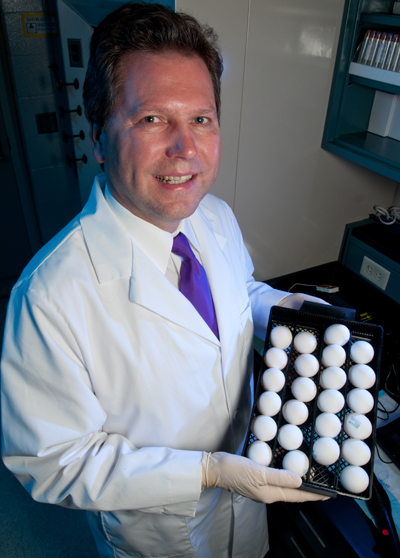K-STATE TO HEAD THE NATIONAL CENTER OF EXCELLENCE FOR EMERGING AND ZOONOTIC ANIMAL DISEASES
 K-State's expertise in vaccine development, diagnostics, animal disease detection and education programs formed the basis for the university's selection as a Center of Excellence for Emerging and Zoonotic Animal Diseases by the Department of Homeland Security, said K-State President Kirk Schulz. K-State will receive $12 million over the next six years.
K-State's expertise in vaccine development, diagnostics, animal disease detection and education programs formed the basis for the university's selection as a Center of Excellence for Emerging and Zoonotic Animal Diseases by the Department of Homeland Security, said K-State President Kirk Schulz. K-State will receive $12 million over the next six years.
"K-State's research focus on zoonotic diseases and animal health, the unique research capabilities of the Biosecurity Research Institute and experienced and world-renowned faculty researchers all aided the selection of K-State for this Center of Excellence," Schulz said. "Because zoonotic diseases can spread from animals to humans and vice versa, this center will be important to protecting human health as well."
Schulz said he believes that K-State's established research infrastructure and the future construction of the National Bio and Agro-Defense Facility -- NBAF -- on the K-State campus also contributed to K-State's selection for the new center.
"We are using 21st-century technology to solve 21st-century problems," he said.
K-State will partner with Texas A&M University's Foreign Animal and Zoonotic Disease Defense Center to co-lead the Science and Technology Directorate's efforts to involve university researchers in zoonotic and animal disease detection. The acronym for K-State's center is CEEZAD.
Juergen Richt is principal investigator and the center's director. At K-State he is a Regents Distinguished Professor in the College of Veterinary Medicine and Kansas Bioscience Authority Eminent Scholar.
"This new Center of Excellence gives K-State the opportunity to build on our infrastructure and enable us to be even stronger leaders in this area," Richt said. "K-State has specialists in infectious diseases who know agriculture systems well, not only livestock but also other food sources including fish and poultry. We will hire new researchers to complement our existing expertise, but more importantly, we will collaborate with outstanding researchers from institutions all over the United States to best protect the nation's food supply."
Ron Trewyn, vice president for research, said K-State was one of five universities competing for the center designation through a three-step process that involved external peer review, internal subject matter expert review and site visits. Reviewers considered a range of factors, including the quality and relevance of the research programs, management plans, education programs, involvement of minority-serving institutions, and transition and application plans.
An announcement from Kansas' congressional delegation noted that, "The Department of Homeland Security is building the nation's premier laboratory for animal disease research, the National Bio and Agro-Defense Facility (NBAF) in Manhattan, Kan., on the Kansas State University campus, making one of the most significant investments to the Kansas economy in state history. The NBAF will replace the aging Plum Island facility, the federal government's current location for animal disease research."
The purpose of the Center of Excellence for Emerging and Zoonotic Animal Diseases will be to conduct research, develop technology and train a specialized work force to successfully defend U.S. pre-harvest agricultural systems against agroterrorism, other catastrophic events and emerging animal pathogens. The center will conduct research on foreign animal, zoonotic and newly discovered pathogens that have a consequential economic impact on U.S. agriculture and homeland security, and a significant impact on human and animal health.
DHS anticipates that both K-State and Texas A&M will conduct projects in all of the thematic areas including vaccines, detection, diagnostics, modeling and simulation, education and training. DHS will work with center leadership to ensure long term coordination and collaboration.